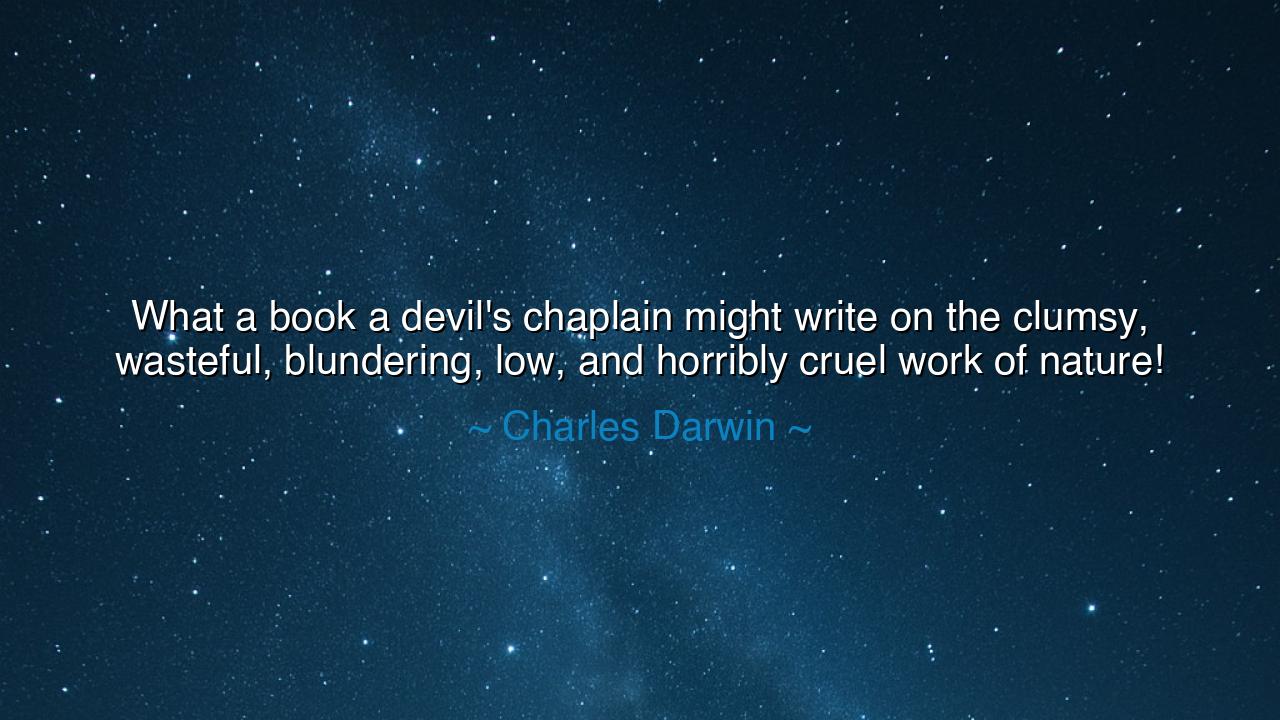
What a book a devil's chaplain might write on the clumsy
What a book a devil's chaplain might write on the clumsy, wasteful, blundering, low, and horribly cruel work of nature!






Charles Darwin, in a moment of both awe and horror at the workings of the natural world, wrote: “What a book a devil's chaplain might write on the clumsy, wasteful, blundering, low, and horribly cruel work of nature!” These words are no light remark, but a cry of recognition of the darker side of nature—its brutality, its indifference, its endless cycle of birth and death. While Darwin revealed the grandeur of evolution, he did not veil its cruelty: the weak devoured by the strong, countless lives lost in the struggle for survival, and the vast waste by which life continually renews itself. His “devil’s chaplain” is the imagined chronicler of these grim truths, a voice that would recount the ruthless logic hidden beneath nature’s beauty.
The origin of this saying is tied to Darwin’s lifelong contemplation of evolution and natural selection. In observing the natural world, from barnacles to finches, he saw not only adaptation and progress, but also immense suffering. For every creature that thrives, countless others perish. Every elegant form is born out of endless trials, mutations, and failures. The phrase “devil’s chaplain” captures the paradox: nature, which gives us life and diversity, also operates with what seems like monstrous indifference to suffering.
History has borne witness to this truth in ways that echo Darwin’s lament. Consider the Irish Potato Famine of the 19th century. A simple blight, born of natural processes, destroyed crops for years and left millions starving. Here, the cruelty of nature appeared not only in disease itself but in the indifference with which it struck, sparing none by moral measure. Likewise, pandemics such as the Black Death reveal the same indifference: human beings, with all their wisdom and hopes, laid low by microscopic organisms, as though life itself were but a cruel lottery.
And yet, Darwin’s observation is not merely despairing—it is also profoundly truthful. By seeing nature as “clumsy” and “wasteful,” he frees us from illusions of perfection. Nature is not an artist painting with harmony, but an endless tangle of trials and errors, in which life itself is hammered into being. From this process emerges not divine symmetry, but the raw, resilient diversity of life. What looks cruel is also the crucible of creation. The hawk’s talons that kill are also the force that hones the speed of the hare. The parasite that destroys its host is also a driver of evolution. Thus, cruelty and creativity are entwined.
The emotional depth of Darwin’s words lies in their honesty. He does not sentimentalize the natural world, as poets often did, nor does he sanitize it for comfort. Instead, he names its blundering, cruel, and lowly aspects, even while dedicating his life to studying it with reverence. Here is wisdom: to see both beauty and brutality together, without denial, and yet to continue seeking truth. The “devil’s chaplain” may write a grim book, but Darwin himself sought to write the book of reality, one that contained both cruelty and grandeur.
The lesson we draw is not to despair of nature, but to understand it with clear eyes. To recognize that cruelty is not malice, but the cost of existence. Life thrives through struggle. The waste and blundering of nature are not signs of failure, but the process by which resilience and adaptation arise. For us, the teaching is that suffering is woven into life’s fabric, but so too is transformation. We must neither romanticize nor curse nature, but learn from it—to endure, to adapt, to create meaning even in the face of its indifference.
Practically, this means cultivating both reverence and realism. When faced with the cruelties of life—disease, death, disaster—do not see them as punishments or cosmic errors, but as part of the same natural order that gives us beauty, joy, and growth. Accept the struggle, but do not surrender to despair. Instead, imitate life’s own response: adapt, endure, and from suffering bring forth strength. For even if a “devil’s chaplain” could write of nature’s horrors, we are called to be the readers who find meaning in them, and the actors who live bravely within them.
Thus Darwin’s words, though heavy, are a gift. Nature is cruel, wasteful, blundering—and yet, from that cruelty arises the miracle of life itself. Let this teaching be carried forward: do not fear the harshness of existence, for within it lies the forge of resilience, the shaping of wisdom, and the birth of all that is enduring.






AAdministratorAdministrator
Welcome, honored guests. Please leave a comment, we will respond soon